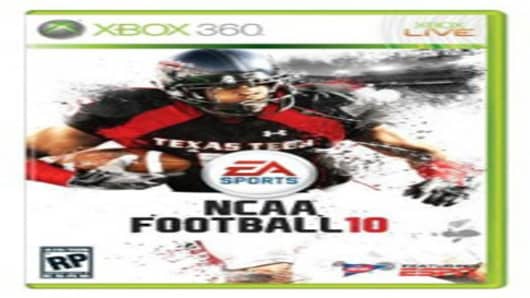Sam Keller might not have been the college quarterback that many thought that he would be, but he soon might make a name for himself as the guy that took down the NCAA.
Keller, who played at Arizona State and Nebraska, is suing Electronic Arts and the NCAA for the "blatant and unlawful use" of student-athlete likenesses in video games.
Electronic Arts doesn't include the players names in the games, but Keller's suit contends that EA "intentionally circumvents the prohibitions on utilizing student athletes' names in commercial ventures by allowing gamers to upload entire rosters, which include players' names and other information."
Keller says that the NCAA and its licensing arm, Collegiate Licensing Company, have approved the use of players names and likenesses.
"With rare exception, virtually every real-life Division I football or basketball player in the NCAA has a corresponding player in Electronic Arts' games with the same jersey number, and virtually identical height, weight, build, and home state. In addition, Electronic Arts matches the player's skin tone, hair color, and often even a player's hair style, although this last characteristic can be highly variable over even a single season."
In one example, Keller uses Kent State running back Eugene Jarvis. Jarvis is 5-foot-5, weighs 170 pounds, wears number six and is a redshirt junior from Pennsylvania. In EA's NCAA 2009, the Kent State running back is 5-foot-5, weighs 170 pounds, wears number 6 and is a redshirt junior from Pennsylvania.
Keller then compares the build of Michigan's Jake Long in the 2009 game to a picture of Long. The two, Keller notes, are identical.
Keller also notes that Electronic Arts goes out of its way to match the players' equipment choices, like wristbands, headbands and even back plates.
Former Texas Tech wide receiver Michael Crabtree, who is on the cover of the 2010 game, is clearly featured in the 2009 game, Keller says. Just like in real life, there's a wide receiver on Texas Tech who wears No. 5, is a six-foot-three redshirt sophomore and even has the back plate under his uniform. In the 2009 game, former Kansas State quarterback Josh Freeman is identical to the virtual Freeman, Keller notes, right down to the arm sleeve.
Keller then introduces GameRosters.com, which I have known about for years. The company has files of each school's roster, which can be uploaded into the game.
"Once uploaded," the suit says, "the default jerseys in the game that contain only players numbers are replaced with jerseys that contain both the player's actual name and actual number and in-game announcers then refer to players by their real names."
Considering the suit is a class action lawsuit, it should be interesting to see how many join Keller, who is asking for profits owed and even seizure and destruction of all copies of any of these video games.
I've seen many lawsuits brought about by student athletes in my day and this is probably the best case I have ever seen constructed. I think Keller was smart to go after the video game business instead of the jersey business because I think he can make a better case with the former even though Nike and adidas call up football programs so that they can only produce jerseys with the numbers the stars are wearing each year.
Update: "Our agreement with EA Sports clearly prohibits the use of names and pictures of current student-athletes in their electronic games," said NCAA spokesman Erik Christianson, in a statement. "We are confident that no such use has occurred and that we will ultimately be dismissed from this lawsuit." Both EA and CLC told us that they will not comment until they have been served with the papers.
Questions? Comments? SportsBiz@cnbc.com



